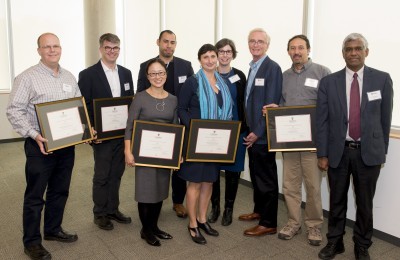MDS Wins Carleton Research Prize Award

October 5, 2015.
The Migration and Diaspora Studies Steering Committee has been awarded a Carleton Research Prize Award for building connections across the university that have had a sustained impact both over time and across research programs.
As the world’s refugee population has reached crisis proportions, members of Carleton’s Migration and Diaspora Studies Steering Committee have been working with international colleagues to publicize and help address the plight of these people.
Most recently, the group hosted an international workshop for researchers and leaders in the migration and diaspora community entitled “Power and Influence in the Global Refugee Regime”. The workshop brought together a prominent group of scholars, practitioners and policy-makers to discuss strategies to improve the current refugee regime.
“One of the inspirations for this group was to combine research and advocacy on migration and diaspora issues,” says Jeff Sahadeo, the Associate Director of the Institute of European, Russian and Eurasian Studies (EURUS) and a member of the steering committee. “Carleton is an ideal location for this collaboration because we have so many people working on this—both on campus and in the national capital.”
While the focus of the MDS initiative has been to build linkages across disciplines, the research interests of individual members of the Steering Committee range from the cultural consequences of globalization and the treatment of issues of personal and collective identity in relation to immigration, multiculturalism (or interculturalism), exile and integration in literature to global refugee policy, the role of international organizations in the management of migration and issues relating to citizenship, and integration in Canada and internationally.”
The group also maintains an active international listserv, which allows members to swap information on refugee sponsorship, country-by-country resources, and the latest news and research on the crisis.
“We are fortunate to have people who are dealing with this issue from all over the world, approaching it from all different angles,” says Professor Sahadeo, a political scientist who’s collaborated with both poets and economists. “This gives us a chance to learn and enrich each other. We have much more in common than we would think.”
Testimonials for the MDS Initiative
“The opportunities presented by the work of the MDS Steering Committee have and continue to position Carleton University as a national and global leader in the field of Migration and Diaspora Studies. Their collaborative, cross-Faculty, style of work has contributed significantly and strategically to Carleton’s further growth and development as a comprehensive university. Because of their dedication to bringing together teams of researchers, regardless of background or academic discipline, the MDS team has achieved continued success in attracting research funding, building capacity and collaborations, and producing cutting-edge research.”
André Plourde, Dean, Faculty of Public Affairs (nominator)
“The MDS Initiative has turned Carleton into a nationally and internationally recognized leader in research and teaching on human mobility and migration, examining its social, cultural, political, and economic implications from an interdisciplinary perspective. In the past two years alone, MDS has enabled a number of research events relevant to the mandate of EURUS (and) was also instrumental in adding a third faculty member with expertise in migration to EURUS.”
Achim Hurrelmann, Director, Institute of European, Russian and Eurasian Studies
“I highly recommend the MDS team for the Building Connections Research Prize. Their recent, dynamic, sustained and solid efforts at creating and nurturing relationships between scholars on campus, and between scholars and the community, have served my department, my research and the communities involved very well.”
Dominique Marshall, Professor and Chair, Department of History
“I have very much appreciated the way in which the MDS works together collectively and harmoniously across traditional academic boundaries. The group has excelled in developing a strong collaboration and has made great strides in a very short period of time. They bring together scholars from a wide range of disciplinary and methodological backgrounds … I think they also help promote Carleton’s reputation as an inclusive and progressive institution that is open to diversity and that helps promote public policies in benefit of marginalized communities.”
Laura Macdonald, Professor and Director, Institute of Political Economy